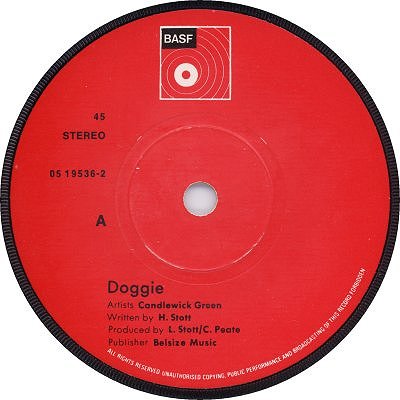
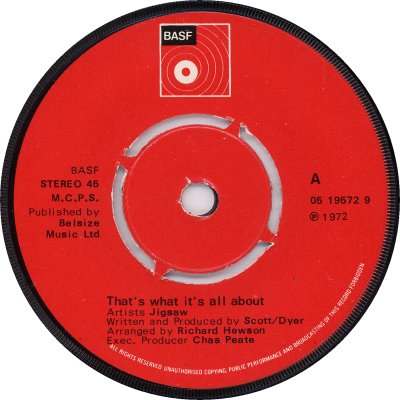

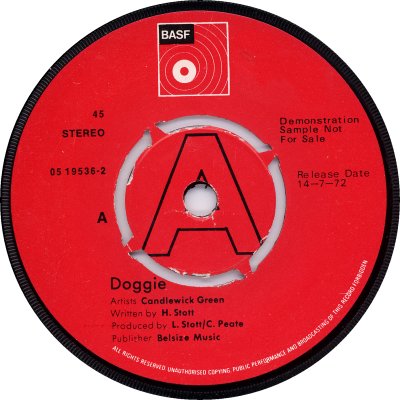
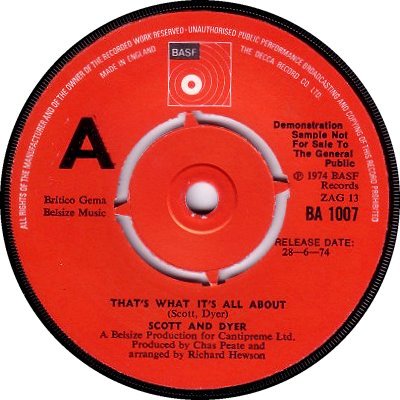
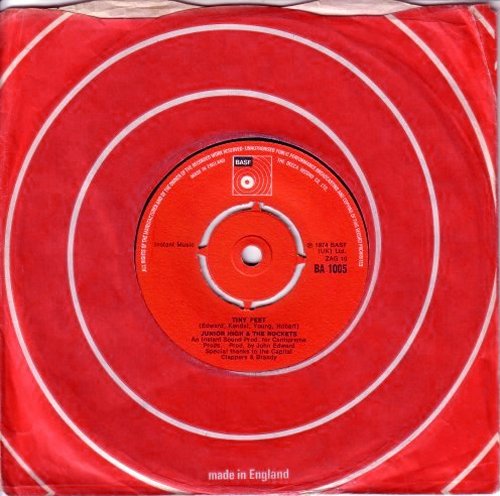
A German label, the record arm of the BASF chemical group. BASF started life in the 1860s as a dye manufacturing company. It branched out into producing other kinds of chemicals, and in the early 1930s was deeply involved in the development of the first practical magnetic tape for recording. Its interests in the field of music stayed focused on the making of blank tapes until the early 1970s, when it began to issue records. 'Billboard' of the 20th of February 1971 reported on the development, saying that the company intended to launch its own record label in Germany on the 1st of March as the first stage of a move into the record business; a UK launch was planned for early in 1972. 'Record Retailer' of the 6th of February agreed with the UK launch date and said that BASF was looking for a pressing and distribution deal. 'RR' of the 25th of September stated that label might make its debut in May 1972 with product which would include a pre-recorded tape line, but it was not until the 15th of July 1972 that 'RR' was able to provide a definite date: the first BASF product would appear on Friday of that week, and would be handled by the British Independent Record Distributors group. Singles were to be given an '05' prefix.
The German parent company concentrated initially on Jazz and Classical albums and its first incarnation in Britain followed the same policy, though it also put out Rock / Pop albums by Trainer and Jigsaw. 'Music Week' of the 23rd of September 1972 advised that BASF's records were available through Lugton, H.R. Taylor, F.D Jackson (of Birmingham), Clyde Factors (Scotland) and Solomon & Peres (Ireland); 'MW' of the 5th of May 1973 added that new singles by Jigsaw and Trainer could now be ordered from those same companies. Those singles were two of only four that the company put out between July 1972 and May 1973, one of them on the 'BASF Cornet' label (q.v.). Their catalogue numbers followed the same format as those of the German company. Three of the four singles were sourced from Chas Peate's 'Belsize Music' production company, with which BASF had a non-exclusive agreement ('BB', 22nd July 1972). BASF's UK operation seems to have run into difficulties before too long, as Candlewick Green's 'Doggie' b/w 'Like We Still Do' (05-19536-2; 7/72) and Jigsaw's 'That's What It's All About' b/w 'And I Like You' (05-19572-9; 4/73) were both quickly re-licensed by Belsize to other companies and reissued, the former by Decca (F-13379; 2/73), the latter by UK (UK-45; 7/73).
In 1974 BASF made a second attempt at cracking the British market. 'Music Week' of the 19th of January broke the news that a three-year pressing and distribution deal had been signed with Decca and would come into effect on the 1st of March. This new venture proved to be longer lasting and more prolific. Again LPs were the main focus but in the first twelve months some fourteen singles were issued, numbered in a BA-1000 series. In addition, by November 1974 BASF had opened a London office - it was mentioned in 'BB' of the 23rd November 1974. Hopes were high: according to 'BB' of the 13th of June 1974 an expansion programme was under way in the USA in a quest for major label status, and the development would include a shift away from the Jazz / Classical focus. Sadly, though, those hopes were not fulfilled.
The autumn of 1975 saw BASF withdrawing from the American record market, following what 'BB' of the 6th of September described as 'several years of barely marginal success'; alternative outlets for the company's licensed labels, including MPS and Harmonia Mundi, were being looked for. Then in 1976 BASF sought an early termination of their deal with Decca in the UK. 'MW' of the 5th of June, reporting on the situation, said that the original agreement was scheduled to end in March 1977. It described the negotiations as 'complex' and 'unresolved' and noted that Decca had stopped pressing BASF records in the interim - product advertized as due for release in June would now not be available. An accord was reached: 'MW' of the 17th of July was able to state that the pressing and distribution deal would end prematurely at the end of that month, and that the UK office of BASF's music division was being closed down. In Germany discussions about the sale of BASF's music division took place between the parent company and Metronome (a Polygram affiliate); according to 'MW' of the 4th of December 1976 they were at an advanced stage, but early the following year 'MW' of the 8th of January reported that the sale had fallen through and that the division was being wound up. After that, BASF concentrated its efforts upon the fields where it had enjoyed a greater measure of success.
One basic label design served for both incarnations of BASF. That of the first single looked rather lopsided (1), while that of the next two was more balanced but still had a slightly sparse appearance (2). With the move to Decca the credits changed position and took on a more normal look; the 'prohibitions' moved to 12 o'clock and were joined by a reference to Decca (3). In addition a company sleeve was introduced (6) - the earlier BASF singles had had picture sleeves, which was unusual for the UK at that time. Promo copies from 1972-73 had a central hollow 'A' and the appropriate text (4), while those from the Decca era were marked after the usual Decca-family fashion (5). CBS handled manufacture during the first period. None of the company's singles ever bothered the chart compilers over here, though Candlewick Green scored with 'Who Do You Think You Are' b/w 'Fingers In Your Ears' on Decca (FR-13480; 12/73) during BASF's lull and Jigsaw went on to register a couple of hits with Chas Peate's Splash label (q.v.), 'Sky High' b/w 'Brand New Love Affair' (CP-1; 9/75) getting into the Top 10. 'Sky High' was released on BASF in several other countries including Germany, Spain, New Zealand, Japan and South Africa. See also BUK.
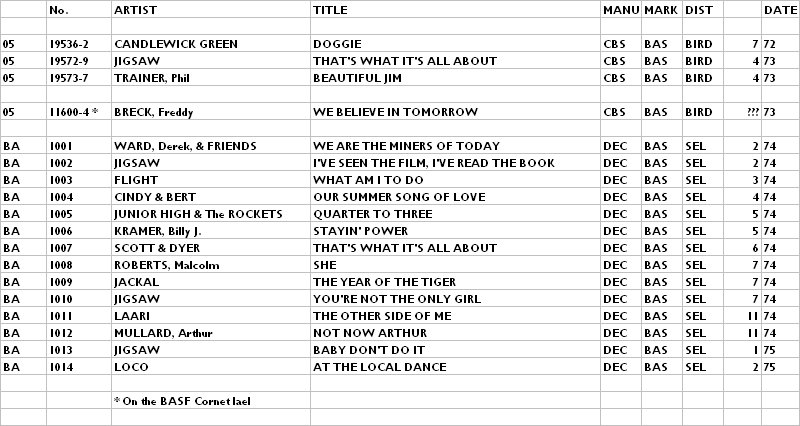


Copyright 2006 Robert Lyons.

